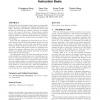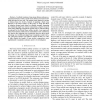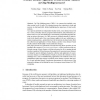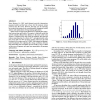145
click to vote
CC
2006
Springer
15 years 5 months ago
2006
Springer
Abstract. Profiling can effectively analyze program behavior and provide critical information for feedback-directed or dynamic optimizations. Based on memory profiling, reuse dista...
108
click to vote
PPPJ
2009
ACM
15 years 6 months ago
2009
ACM
Reuse distance analysis has been proved promising in evaluating and predicting data locality for programs written in Fortran or C/C++. But its effect has not been examined for ap...
147
click to vote
ACMMSP
2004
ACM
15 years 7 months ago
2004
ACM
Feedback-directed optimization has become an increasingly important tool in designing and building optimizing compilers. Recently, reuse-distance analysis has shown much promise i...
ICC
2007
IEEE
15 years 8 months ago
2007
IEEE
Abstract— In cellular systems a large reuse distance reduces cochannel interference while a small reuse distance increases bandwidth allocated to each cell. The optimal reuse dis...
130
click to vote
CC
2010
Springer
15 years 9 months ago
2010
Springer
On Chip Multiprocessors (CMP), it is common that multiple cores share certain levels of cache. The sharing increases the contention in cache and memory-to-chip bandwidth, further h...
225
click to vote
POPL
2007
ACM
16 years 2 months ago
2007
ACM
Reuse distance (i.e. LRU stack distance) precisely characterizes program locality and has been a basic tool for memory system research since the 1970s. However, the high cost of m...




